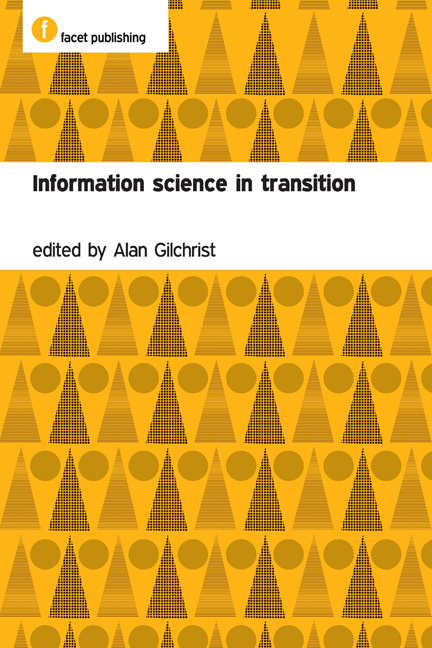Book contents
- Frontmatter
- Contents
- Contributors
- Preface
- Editorial
- Guest Editorial: Meeting the challenge
- 1 Fifty years of UK research in information science
- 2 Smoother pebbles and the shoulders of giants: the developing foundations of information science
- 3 The last 50 years of knowledge organization: a journey through my personal archives
- 4 On the history of evaluation in IR
- 5 The information user: past, present and future
- 6 The sociological turn in information science
- 7 From chemical documentation to chemoinformatics: 50 years of chemical information science
- 8 Health informatics: current issues and challenges
- 9 Social informatics and sociotechnical research – a view from the UK
- 10 The evolution of visual information retrieval
- 11 Information policies: yesterday, today, tomorrow
- 12 The disparity in professional qualifications and progress in information handling: a European perspective
- 13 Electronic scholarly publishing and Open Access
- 14 Social software: fun and games, or business tools?
- 15 Bibliometrics to webometrics
- 16 How I learned to love the Brits
- Index
2 - Smoother pebbles and the shoulders of giants: the developing foundations of information science
Published online by Cambridge University Press: 08 June 2018
- Frontmatter
- Contents
- Contributors
- Preface
- Editorial
- Guest Editorial: Meeting the challenge
- 1 Fifty years of UK research in information science
- 2 Smoother pebbles and the shoulders of giants: the developing foundations of information science
- 3 The last 50 years of knowledge organization: a journey through my personal archives
- 4 On the history of evaluation in IR
- 5 The information user: past, present and future
- 6 The sociological turn in information science
- 7 From chemical documentation to chemoinformatics: 50 years of chemical information science
- 8 Health informatics: current issues and challenges
- 9 Social informatics and sociotechnical research – a view from the UK
- 10 The evolution of visual information retrieval
- 11 Information policies: yesterday, today, tomorrow
- 12 The disparity in professional qualifications and progress in information handling: a European perspective
- 13 Electronic scholarly publishing and Open Access
- 14 Social software: fun and games, or business tools?
- 15 Bibliometrics to webometrics
- 16 How I learned to love the Brits
- Index
Summary
Abstract
Some developments in the information science discipline over a period of 30 years are discussed, by selecting topics covered in the early issues of Journal of Information Science, and tracing their influence on subsequent developments, largely though by no means exclusively through JIS papers. Five main themes are covered: the information discipline per se; the foundations of that discipline; the nature of information; relations between discipline and profession; and education for information science. The continuing resonance of the writings of Farradane and Brookes is noted.
Introduction
The Journal of Information Science (JIS) was first published in 1979, replacing The Information Scientist (TIS) which – though described as the ‘journal of the Institute of Information Scientists’ – was not generally regarded as a true academic/professional journal. The intervening period of nearly 30 years, a time span commonly taken as equivalent to a ‘generation’, gives the opportunity to consider the issues covered in the early issues of JIS, to set them into the context of the development of the information science discipline over time, and to assess the significance of some of the main contributions and contributors.
This is done by focusing on some of the articles and editorials published in the first two volumes of JIS, covering the years 1979 and 1980, tracing some of the preceding treatment of the issues, and following later developments, particularly – though not exclusively – through the pages of TIS and JIS. The set of literature cited is selected to show the origins and development of the issues, and is in no way intended to be comprehensive.
The discussion is focused around five main, albeit overlapping, themes. An initial consideration of the information science discipline itself leads fairly naturally to thoughts on the foundations of the discipline, and that in turn to the central question of the nature of information. There follows a consideration of the relation between discipline and profession, and in particular the role of research, and the closely associated question of the most appropriate form of education for information science. As we shall see, all of these themes are represented in the first issues of JIS, and all have remained ‘live’ topics to the present day.
- Type
- Chapter
- Information
- Information Science in Transition , pp. 23 - 44Publisher: FacetPrint publication year: 2009



